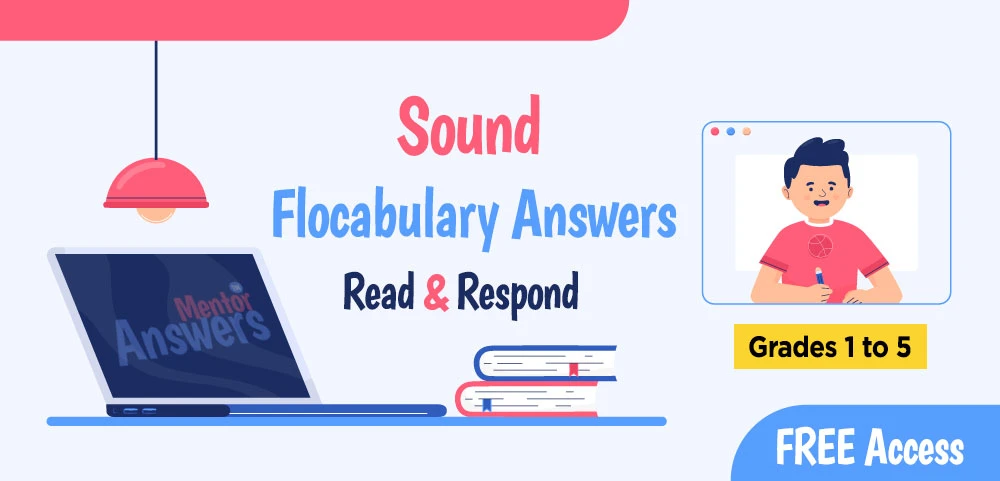Are you looking for a reliable source of answers for the Sound Flocabulary Quiz, Read & Respond? You’ve come to the right place!
We have a team of teachers who have checked and verified the correct answers for all the questions. You can trust our expertise and save time by using our answers key.
Sound Flocabulary Quiz Answers Key
- humming a Flocabulary song in the hallway
- plucking a guitar string underwater
- knocking a fist against a wooden wall
- snapping your fingers where there is no matter, like in deep space
- They can only hear it.
- They can only hear and see it.
- They can hear it, and might also see and feel it .
- Humans cannot perceive sound.
- The noise starts out low pitched and becomes high pitched.
- The part of the ruler he hit is moving back and forth.
- The part of the ruler he hit is completely still.
- The noise starts out soft but becomes louder.
- Sound energy travels in waves that need a solid, liquid or gas to carry them.
- Sound energy travels in waves that can move through the vacuum of empty space.
- Sound energy travels in a straight line in one direction.
- Sound energy travels in a straight line that switches directions periodically.
- the width of a wave
- the rate at which a wave occurs
- the height of a wave
- the lowest point of a wave
- a loud sound.
- a low-pitched sound.
- a high-pitched sound.
- a soft sound.
- the distance to the highest point of a wave
- the distance between waves
- the distance from which a sound can be detected
- the distance across the widest point of a wave
- a loud sound.
- a low-pitched sound.
- a high-pitched sound.
- a soft sound.
- The sound was completely absorbed by the mountain.
- The sound reflected back to Gwen as an echo.
- The sound was completely carried through the mountain away from Gwen.
- The sound didn’t travel as a wave at all.
- Sound does not travel in a wave.
- Sound is not a form of energy.
- Sound needs a material to carry its energy.
- Sound cannot be perceived by humans.
Sound Flocabulary Read & Respond Answers
Expand your knowledge by exploring the Read & Respond answers related to the topic of our Subject:
- there is no energy in deep space.
- there is no light to see it in deep space.
- there are no molecules to carry it in deep space.
- there is no heat in deep space.
- “This creates a wave.”
- “Picture holding the ends of a slinky between two hands.”
- “Ears can detect the vibrations, which the brain processes as sound.”
- “When something vibrates, molecules are compressed, or squeezed together.”
- A“They create sounds and, based on the echoes, they can determine where things are in space.”
- B“In some cases, some might also be reflected off the surface and bounce back.”
- C“That’s called echolocation.”
- D“Some of it might be absorbed into the substance.”
- Sound moves in waves through a medium.
- A guitar is a musical instrument that has strings.
- There are three main components of the human ear.
- We can perceive sound with our senses.
- Air from the lungs makes the vocal cords vibrate.
- Air keeps the vocal cords from touching.
- Air carries sound from the throat to the lungs.
- Air moves the larynx up when a person breathes out.
- A sound is passed from the outer ear to the middle ear and then to the inner ear as a vibration. In the inner ear, the vibration causes a series of movements ending in fluid motion that triggers a nerve to carry a message to the brain.
- A sound is collected by the ear drum and sent to the cochlea where it is converted into a nerve signal. Fluid carries that signal to the brain.
- A sound is collected by the outer ear and sent to the cochlea as a nerve signal. The signal is processed by fluid in the cochlea as the sound a person hears.
- A sound is passed from the inner ear to the middle ear and then to the outer ear, where the eardrum vibrates. This vibration triggers the brain to send a signal to a nerve.
- the faster the vibration, the lower the frequency of the sound wave
- When it’s night time, your part of the Earth is facing away from the sun.
- the faster the vibration, the higher the frequency of the sound wave
- the longer the vibration lasts, the shorter the frequency of the sound wave
Are you interested in delving into additional subjects and Lessons related to Flocabulary? Check Here To Get All Flocabulary Answers Key
If you have any questions or need more answers key for your favorite subject, please leave a comment below or contact us through our website. We would love to hear from you and assist you in your learning journey.

